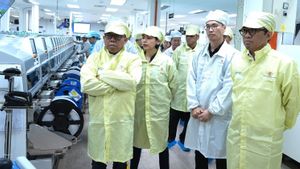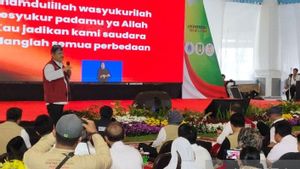JAKARTA - The Indonesian economy is predicted to continue to grow in the second semester of 2022. If the government can maintain the positive momentum of economic growth by maintaining people's purchasing power, it is predicted that Indonesia can survive the challenges in 2023.
"The growth support will come from household consumption as PPKM is still loose (increased public mobility). Then there is the consumption of education services which will seasonally increase household consumption, then there are salaries for 13 civil servants as well," said Bank Mandiri economist Faisal Rahman, Tuesday, August 9th.
Faisal said, in August there is a moment that will encourage consumption. For example, independence day discounts, social assistance including direct cash assistance (BLT), and subsidies to prevent the decline in purchasing power of the poor as a result of rising inflation.
The latest data from the Central Statistics Agency (BPS) states that the Indonesian economy based on GDP in the second quarter of 2022 reached IDR 4,919.9 trillion or grew by 5.44 percent.
Previously, Finance Minister Sri Mulyani stated that the government would try to maintain the economy at a good level for the remainder of the second semester of 2022. One of the sectors that is expected to drive growth is Ministry and Institutional spending.
According to Faisal, this year's absorption of government spending in the first semester was higher than the previous year. However, he said, what is still not optimal is local government spending.
"Actually, for the central government, the acceleration of spending to support economic recovery has begun. However, what has not been done is still in the local government because there are still funds that have not been realized," said Faisal.
Strengthen Purchasing PowerMeanwhile, Chairman of the Indonesian Socio-Economic Cadre Association (AKSES) Suroto said the government must strengthen people's purchasing power to maintain the Indonesian economy.
Furthermore, Suroto explained that the foundation of Indonesia's economy lies in domestic consumption. Therefore, he said, what should be done is to maintain the sustainability and existence of the domestic demand side which is closely related to people's purchasing power.
"The most important thing when 60 to 70 percent of the economic foundation is consumption, automatically what needs to be saved is the demand side, the purchasing power," said Suroto.
Previously, the Coordinating Minister for Economic Affairs Airlangga Hartarto said that the realization of the national economic recovery fund (PEN) this year would not be optimally absorbed. Considering the case of the COVID-19 pandemic this year is more under control than before.
"The absorption of PEN funds for the health sector will not be optimal because the COVID-19 case is relatively under control," said Coordinating Minister Airlangga.
The General Chair of the Golkar Party added that the PEN budget for the health sector will be relocated to other sectors. One of them is to support the productive sector, such as social assistance in the PEN program.
Besides PEN, the government has a Social Assistance program. Finance Minister Sri Mulyani Indrawati revealed that the social protection budget in 2023 will reach Rp432.2 trillion to Rp441.3 trillion. Social assistance is still needed, but the government is also evaluating the types and targets of social assistance.
The English, Chinese, Japanese, Arabic, and French versions are automatically generated by the AI. So there may still be inaccuracies in translating, please always see Indonesian as our main language. (system supported by DigitalSiber.id)













